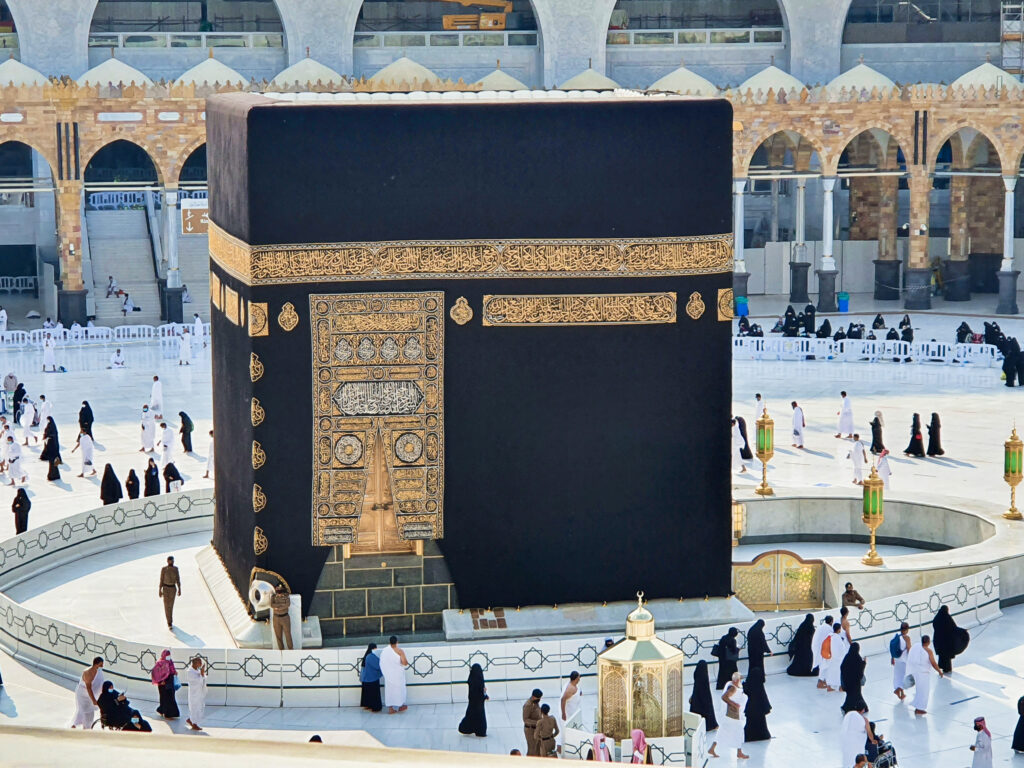
Mecca, the spiritual epicenter of Islam, stands as a city with unparalleled significance and sanctity. Nestled within the arid landscapes of Saudi Arabia, Mecca is a place of pilgrimage, drawing millions of devout Muslims from around the globe each year. Home to the Kaaba, the holiest structure in Islam, Mecca is a sacred destination where the faithful embark on the Hajj, a journey that symbolizes unity, humility, and devotion. The city’s history is intertwined with the earliest moments of Islam, making its ancient streets and revered sites repositories of centuries of religious heritage. As the birthplace of the Prophet Muhammad and the site of pivotal events in Islamic history, Mecca radiates a spiritual aura that transcends time. In this blog, we embark on a virtual exploration of Mecca, delving into its sacred landscapes, rich history, and the profound experiences that make it a beacon of faith for millions.
Location of Mecca
Mecca, a city of profound spiritual significance, is situated in the western region of Saudi Arabia, within the heart of the expansive Arabian Peninsula. Nestled amidst the rocky terrain of the Sirat Mountains, Mecca holds a strategic position along ancient trade routes, making it historically pivotal as a crossroads for merchants and pilgrims alike. Surrounded by the vastness of the desert, Mecca’s location adds a mystical allure to its sacred atmosphere. The city is further distinguished by its proximity to the Red Sea, creating a harmonious blend of arid landscapes and coastal charm. This geographical setting, framed by the arid beauty of the Arabian Peninsula and the azure waters of the Red Sea, positions Mecca as not only the spiritual center of Islam but also a destination where the terrestrial meets the divine, inviting millions annually to embark on a transformative journey of faith.
The History of Mecca
Mecca, steeped in the annals of antiquity, unfolds a tapestry of history that predates Islam itself. Nestled within the barren beauty of the Arabian Peninsula, Mecca’s historical significance is deeply rooted in the ancient caravan routes that crisscrossed the region. Long before the advent of Islam, Mecca was a bustling center of trade and commerce, strategically positioned along the spice and incense routes that connected the Arabian Peninsula with Africa, Asia, and Europe.
Legend has it that the origins of Mecca trace back to the time of Prophet Ibrahim (Abraham), who, according to Islamic tradition, along with his son Prophet Isma’il (Ishmael), played a pivotal role in the establishment of the Kaaba—the sacred cubic structure at the heart of the Grand Mosque. Over the centuries, Mecca continued to be a center of religious significance, housing various idols and deities in the Kaaba, until the advent of Islam in the 7th century.
In 610 CE, the Prophet Muhammad received his first revelation in the Cave of Hira, located near Mecca. This event marked the beginning of Islam, and over the next two decades, the Prophet’s teachings gradually gained momentum, challenging the polytheistic beliefs of the city’s inhabitants. The Hijra, the Prophet’s migration from Mecca to Medina in 622 CE, was a turning point, leading to the establishment of the first Islamic state.
However, Mecca’s history remained intertwined with the nascent Islamic community, and in 630 CE, Prophet Muhammad, alongside a growing number of followers, peacefully reclaimed Mecca. The city underwent a transformation, with the idols in the Kaaba removed, and it became the spiritual and cultural nucleus of the burgeoning Islamic civilization.
Since then, Mecca has stood as a symbol of faith, unity, and pilgrimage, drawing millions annually to partake in the rituals of Hajj and Umrah. Its history encapsulates the evolution of a humble trading outpost into a global epicenter of spiritual devotion and cultural heritage, making Mecca not only the birthplace of Islam but a living testament to the enduring power of faith and history.
Mecca’s Significance
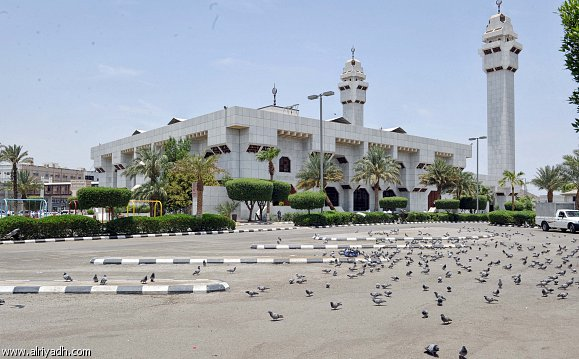
Mecca, the spiritual heart of Islam, stands as a beacon of significance that transcends both geographical and religious boundaries. Nestled in the cradle of Saudi Arabia, this sacred city holds unparalleled importance for Muslims worldwide. At its core lies the Grand Mosque, home to the Kaaba, the symbolic house of God, around which millions of worshippers unite in prayer daily.
Mecca’s ultimate significance is epitomized during the annual Hajj pilgrimage, one of the Five Pillars of Islam. Pilgrims from every corner of the globe converge upon the city, clad in simple white garments, to perform rituals that trace the footsteps of Prophet Ibrahim and his family. The spiritual journey encompasses the symbolic circumambulation of the Kaaba, the symbolic stoning of Satan, and the poignant ascent of the hills of Safa and Marwah.
Beyond the rituals, Mecca encapsulates the essence of Islamic unity, underscoring the belief in the oneness of God and the equality of all believers. The city is a microcosm of cultural and ethnic diversity, where people from myriad backgrounds come together in a shared commitment to faith.
Mecca’s significance, however, extends beyond its spiritual dimension. It is a focal point for charitable acts, community service, and the strengthening of bonds among Muslims. The city’s history, dating back to the time of Prophet Ibrahim and earlier, adds layers of cultural and historical importance.
In essence, Mecca’s significance lies not only in its physical presence as the birthplace of Islam but also in the profound spiritual and communal connections it fosters. It is a city that beckons the faithful to embark on a transformative journey, transcending the earthly realm to draw closer to the divine. Mecca’s enduring importance resonates not only in the hearts of Muslims but also in the broader tapestry of global religious and cultural heritage.
Climate of Mecca
Mecca, nestled within the arid landscapes of Saudi Arabia, experiences a climate that is both challenging and deeply rooted in the region’s desert environment. Characterized by high temperatures and low humidity, the city’s climate is reflective of its geographical location. Summers in Mecca, from May to September, are scorching, with daytime temperatures often exceeding 40 degrees Celsius (104 degrees Fahrenheit). The intense heat is alleviated somewhat by the cooling winds that sweep across the desert.
Winters, from November to February, bring relief from the searing heat, with daytime temperatures ranging from the mid-teens to mid-20s in Celsius (60s to 70s in Fahrenheit). Nights can be cool during this season, providing a more pleasant climate for outdoor activities and exploration.
One notable meteorological phenomenon in Mecca is the occurrence of sudden and brief but intense rain showers, especially during the winter months. These infrequent downpours, known as “Saiyals,” contribute to the renewal of the arid landscape and are considered a welcome event.
Despite the challenges posed by its arid climate, Mecca’s spiritual significance draws millions of pilgrims, especially during the annual Hajj pilgrimage. Pilgrims endure the heat, embodying a shared commitment to faith and unity in the face of the harsh desert conditions. Mecca’s climate, while demanding, is an integral part of the city’s identity, shaping the experiences of those who visit this sacred destination.
Site and People of Mecca
Mecca, a city draped in spiritual significance, unfolds its unique tapestry through both its sacred sites and its diverse population. At the heart of Mecca lies the Grand Mosque, an architectural marvel embracing the Kaaba, a site revered by millions of Muslims worldwide. Pilgrims, draped in seamless white garments, circumambulate the Kaaba in unison, embodying the unity and equality intrinsic to Islamic teachings. The hills of Safa and Marwah echo with the footsteps of believers retracing Hagar’s journey, a poignant pilgrimage act during Umrah.
Beyond the religious landmarks, the people of Mecca contribute immensely to the city’s character. A convergence of cultures and ethnicities is palpable, as locals and visitors alike share the common thread of faith. The streets bustle with a vibrant energy, and the markets, or souks, beckon with the aromas of traditional spices and the vibrant colors of diverse wares.
Meccans, known for their hospitality, extend warm welcomes to pilgrims and tourists alike, creating an atmosphere of camaraderie and shared devotion. The city comes alive during Hajj and Umrah seasons, with people from every corner of the globe joining together in a profound expression of faith.
The people of Mecca are not just residents; they are stewards of a city that holds a central place in the hearts of Muslims worldwide. Their daily lives are intertwined with the ebb and flow of spiritual rituals, cultural celebrations, and the continuous influx of visitors seeking a connection to the divine. In Mecca, the sites and the people harmonize to create an extraordinary blend of sacred tradition and vibrant community, making it a city unlike any other in the world.
Best Attractions in Mecca
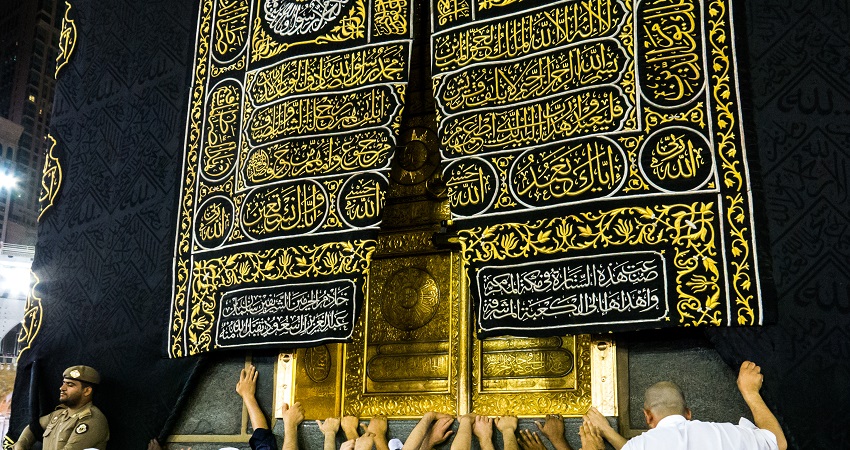
Mecca, steeped in spiritual significance and historical resonance, unfolds as a city with attractions that transcend religious devotion. At the heart of Mecca lies the Grand Mosque, an architectural masterpiece that cradles the Kaaba, the focal point of Muslim prayers. The sheer magnificence of the mosque, especially during Hajj and Umrah seasons, is an awe-inspiring spectacle that encapsulates the essence of faith and unity.
For a panoramic perspective of Mecca’s skyline, a visit to the Abraj Al-Bait Towers is essential. The iconic Clock Tower, an integral part of the complex, not only serves as a symbol of modernity but also offers breathtaking views of the city. Exploring the Abraj Al-Bait Mall within the towers presents an opportunity to blend modern shopping experiences with the spiritual ambiance of Mecca.
The hills of Safa and Marwah, symbolizing Hagar’s search for water, offer pilgrims and visitors a profound spiritual journey, while the Zamzam Well, a source of blessed water, holds a special place in the hearts of those who seek its sanctity. Delving into Mecca’s history, the Cave of Hira, where the Prophet Muhammad received his first revelation, provides a serene retreat for reflection and contemplation.
To gain a deeper understanding of Islamic heritage, the Al-Haramain Museum takes visitors on a comprehensive journey through time, showcasing artifacts and exhibits that highlight the city’s cultural and religious significance. While Mecca is primarily a destination for spiritual reflection and devotion, these attractions weave together a narrative of faith, history, and cultural richness, offering visitors a multifaceted experience that extends beyond the sacred rituals.
Best Things to Do in Mecca
Mecca, with its deep spiritual resonance and historical significance, offers a unique array of experiences that extend beyond religious observances. While the primary focus for many is the sacred rituals associated with the Hajj pilgrimage, the city also presents opportunities for enriching and diverse activities. Begin your exploration by visiting the Grand Mosque, home to the Kaaba, the most revered site in Islam. Marvel at the intricate architecture and immerse yourself in the spiritual ambiance of this holiest of places.
Climbing the hills of Safa and Marwah, retracing the steps of Hagar in a symbolic act during Umrah, provides a profound connection to the city’s religious heritage. The Abraj Al-Bait Towers, with the colossal Clock Tower, dominate the skyline and offer a panoramic view of Mecca. Don’t miss the Zamzam Well, a source of blessed water that holds historical significance.
For those seeking cultural insights, the Abraj Al-Bait Mall showcases a blend of modernity and tradition, housing high-end shops and eateries. Exploring the vibrant local markets, or souks, allows for a taste of authentic Meccan life, with diverse goods and traditional crafts on display.
A visit to the Cave of Hira, where Prophet Muhammad received his first revelation, offers a tranquil retreat and a chance for reflection. The Al-Haramain Museum provides a comprehensive journey through Islamic history, enhancing the understanding of Mecca’s cultural and religious importance.
While Mecca primarily serves as a place of spiritual devotion, these activities provide a well-rounded experience for visitors, offering a deeper connection to the city’s history, culture, and the spiritual essence that pervades every corner of this sacred destination.
How Good are Saudi Arabia Tours?
Saudi Arabia Tours prides itself on being the best travel agency in Saudi Arabia as proven by our numerous positive reviews.
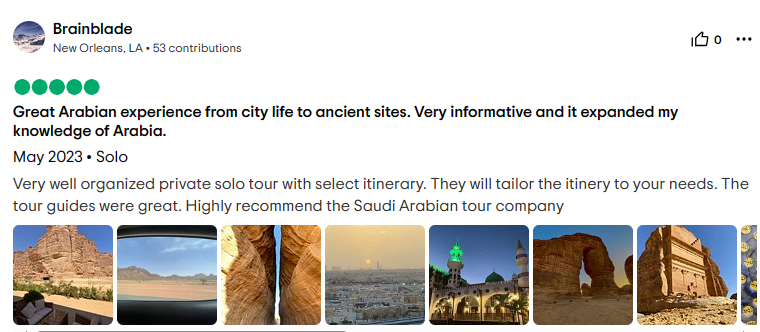
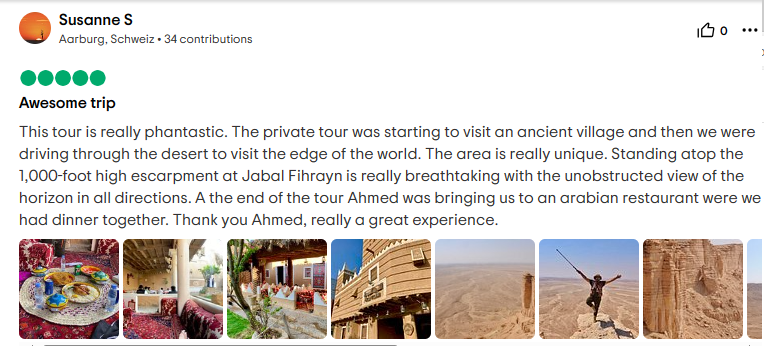

Frequently Asked Questions?
Is Saudi Arabia safe for tourists?
Tourists have been visiting Saudi Arabia and Saudi Arabians have a well-earned reputation for warmth and kindness toward visitors. Saudi Arabia cities are generally very safe, especially in areas where tourists frequent.
How to get a Saudi tourist visa?
Applying for a tourist visa to Saudi Arabia is easy. If you are from one of the 49 eligible countries, you can apply through the eVisa website. Holders of US, UK, or Schengen visas can apply for the visa upon arrival. Saudi Arabia is opening its doors to the world through its new tourist visa. Visitors will have the chance to discover and experience the warm hospitality of the Saudi people, the rich heritage, the vibrant culture, and Saudi Arabia’s diverse and breathtaking landscapes. The visa will be a one-year, multiple-entry visa, allowing tourists to spend up to 90 days in the country.
Are non-Muslims allowed in Saudi?
Non-Muslims can travel to all cities in Saudi Arabia except Medinah and Mekkah, Not allowed to non-Muslims to enter Mecca and Medinah.
Can I wear jeans in Saudi Arabia?
Both men and women are asked to dress modestly in public, avoiding tight-fitting clothing. Women should cover their shoulders and knees in public.
Contact us for more information on:
saudiarabiatours.net@gmail.com
Address: Head Office Olaya St, Riyadh 12213, Saudi Arabia.
If you are booking and taking the tour within 24 hours, or have an urgent request, call us on
Cell/whatsapp : +966558018938 For more info please visit Saudi Arabia Tours

